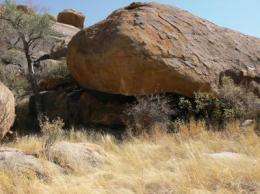Ancient domesticated remains are oldest in southern Africa

Researchers have found evidence of the earliest known instance of domesticated caprines (sheep and goats) in southern Africa, dated to the end of the first millennium BC, providing new data to the ongoing debate about the origins of domestication and herding practices in this region.
The full results are published July 11 in the open access journal PLoS ONE.
The researchers, led by David Pleurdeau of the National Museum of Natural History in Paris and Eugène Marais of the National Museum of Namibia, investigated remains from Leopard Cave in Namibia.
They could not determine whether the remains came from a sheep or goats, but they write that there is no doubt that the teeth came from domesticated animals.
These remains have been found associated with hundreds of archaeological findings, including stone and bone tools as well as beads and few potsherds.
The location and antiquity of the remains may provide further information about the domestication timeline, as well as potential movement patterns, for early herders in the region.
More information: Pleurdeau D, Imalwa E, De´ troit F, Lesur J, Veldman A, et al. (2012) ''Of Sheep and Men'': Earliest Direct Evidence of Caprine Domestication in Southern Africa at Leopard Cave (Erongo, Namibia). PLoS ONE 7(7): e40340. doi:10.1371/journal.pone.0040340
Journal information: PLoS ONE
Provided by Public Library of Science




















